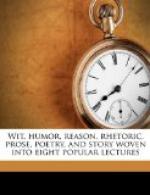The girl, when she had grown to womanhood, heard that Aunt Hannah was still living and she longed to see her devoted old colored mammy. Her parents had the same desire, and with other attachments for the old southern home, they went back to Georgia on a visit and to the village where the old woman lived. She was sent for and the old black mammy and the beautiful young girl faced each other. The young lady was disappointed. She expected to see a nice, comely old woman, but there she stod, crippled with rheumatism, gray headed, wrinkled, and poorly clad. The old woman was surprised, for there before her stood a beautiful young woman, with rosy cheeks, blue eyes, auburn locks and queenly form. The father and mother stood near, with tears rolling down their cheeks as memory came surging up like successive waves from out a past hallowed to them, for they could see in that old woman the health and strength of their child.
The old woman broke the silence, saying: “Is dat my chile? Is dat de chile I loved and laid wake wif so many nights and cooked so many sweet things for? Why, bless yo’ heart, honey; dese old hands ust to take yo’ and hug yo’ to dis bosom, but yo’s too nice now for dese old hands to eber touch agin.”
The young girl said: “No, I’m not, Aunt Hannah. You shall take me in your arms as when I was a little child,” and she gave a bound into the old woman’s arms.
That does not mean social equality, but it does mean gratitude neither condition nor color can ever bound. If the reciprocities of that old woman and that beautiful girl were such as to weave enrichments into both hearts, why should not all peoples, and all individuals, see in all others but a multiplication of the one each of us is, and that each is enhanced or diminished in value according to the concentrated worth of the whole? If man would stand in his lot of conformity to man, as that old colored woman stood in her lot, it would lift this world to that height from which we could see the one interest, one reciprocal, interdependent, together-woven, God-allied and God-saved humanity.
But in this we fail. Several men, one of them an Irishman, were standing on a street corner when a negro passed. The Irishman said: “Faith, and if I had been makin’ humanity for a world, I would niver have made a nager.” I suppose in return the negro would not have made the Irishman, nor would the white man have made the Indian or Chinaman, but God made them all and in proportion as we have the philanthropic comprehensiveness to accept them all, and benevolently try to serve them in their places, do we honor the place assigned us in the world’s creation. It is not for us to know why God made this or that; He made everything for a purpose.
A father took his boy to an animal show. The lad had never seen a monkey and as they played their pranks about the cage he said: “Father, did God make monkeys?”
When the father replied: “Yes,” the boy said: “Well, don’t you guess God laughed when he made the first monkey?”




